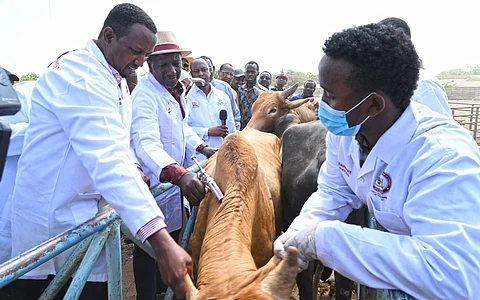

Sections of Kenyan farmers and the general public have continued to protest against a nationwide livestock vaccination programme by the government, with some describing it as a “globalist agenda with negative outcomes”.
The Government of Kenya plans to vaccinate approximately 22 million cattle alongside 50 million goats, sheep and small livestock throughout the next three years in a programme that critics claims is shrouded in mystery and allegedly mandatory.
Despite explanations by State officers that the exercise is necessary for Kenyan beef and dairy products’ global market compliance and access, resistance continues to mount. “We are not guinea pigs, for heaven’s sake. We don’t want the mandatory livestock vaccination, lest it kills our animals and only livelihood,” lamented Hellen Akinyi, a local farmer in the western part of the country while speaking to the local press.
Poor communication and seeming secrecy that shroud the countrywide exercise have not helped the situation. This has resulted in conspiracy theories, with some protesters claiming the drive is part of a wider scheme by billionaire Bill Gates to alter livestock DNA in Africa and other poorer continents to reduce methane emissions.
The Kenya Veterinary Association recently joined the fray, asking the government to suspend the livestock vaccination programme, citing the protests, ambiguity and the fact that the Association, which is a key stakeholder, was not consulted. The Association, through its chairperson Kelvin Okore, is demanding transparency on the diseases being targeted, the rationale behind the vaccination and the identity of the programme’s sponsors.
“We have not had any stakeholder engagement for the development of his programme. In fact, our opinion has only been sought after the programme has received controversy from the public. Several critical questions remain unanswered. For instance, how long the programme will run and who is funding it,” said Okore, adding that some of the rumored diseases the exercise aims to curb are specific to certain local regions and do not justify a national vaccination campaign.
“A vaccination exercise needs to be tailored to specific regions. For example, you cannot vaccinate against foot-and-mouth disease (FMD) in the whole country. There are areas in this country where FMD is not such a challenge. So why would you go and waste resources there? So, the vaccination exercise needs to be tailored to the areas where diseases are endemic to,” said Okore.
Those opposed to the countrywide vaccination are now calling for the suspension of the programme, asking the government to prioritise addressing other pressing issues affecting the livestock sector before allocating billions of shillings to the pointless countrywide vaccination initiative.
President William Ruto has, however, remained bullish, saying the animal vaccination programme must go on for it is meant to effectively control livestock diseases and ensure healthier breeds and dairy and beef exports.
“Previously, this exercise has not been effective and efficient because it was done in selected parts of the country. Under the new programme, vaccination will cover 22 million cattle and 50 million sheep and goats in all parts of our country. It will be the beginning of more government investment in the livestock sub-sector to make it achieve its immense potential and make its full contribution to the economy,” said Ruto while addressing farmers’ concerns during a visit to the western part of the country.
The Kenyan agriculture ministry, under the stewardship of Cabinet Secretary Mutahi Kagwe, has remained confident and decisive despite protests and has been going round launching the initiative in different parts of the country.
In statement to the press after one of his several nationwide launches, Kagwe said: “Today, I launched the Nationwide Livestock Vaccination Campaign in Laikipia County. This three-year initiative will vaccinate livestock against FMD biannually and Peste des Petits Ruminants (PPR) annually, aiming to protect our livestock and enhance productivity.”
Kagwe explained that FMD and PPR cause significant economic losses, with recent outbreaks in several counties leading to quarantines. The minister added that, “The government is committed to eradicating these diseases and achieving disease-free status from the World Organization for Animal Health.”
While softening his stance and clearing the air that the exercise is voluntary, Kagwe further urged farmers to ensure their livestock are vaccinated as scheduled to protect their health, boost productivity and safeguard livelihoods.
As assessments continue, the campaign’s success will depend on sustained government commitment and stakeholder collaboration, according to the experts, including the Kenya Veterinary Association.